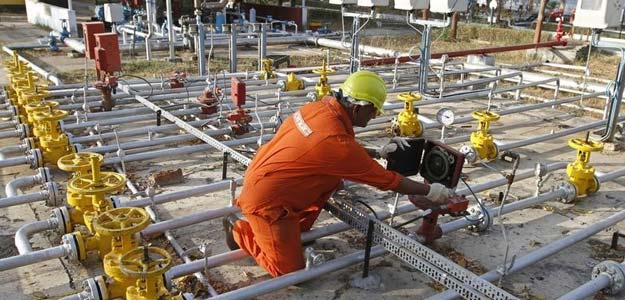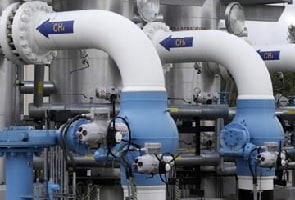
Shares
of state-run explorers ONGC and Oil India fell on Wednesday ahead of
the announcement of the revised prices for domestically-produced natural
gas. ONGC fell as much as 2 per cent, while Oil India declined as much
as 3.6 per cent.
Reuters, citing sources, said the government is likely to announce an 18 per cent reduction in natural gas prices. The new prices will be for the October to March period.
Prices of natural gas will be cut to $3.82 per million British thermal units (mmBtu) on gross heat value basis, Reuters said citing sources. On net heat value basis natural gas prices will cost $4.24 per mmBtu compared to $5.18 per mmBtu for the April-September period, it added.
Analysts said the price cut will impact ONGC and Oil India's profitability. A $1/mmBtu price cut will lower ONGC's FY16 earnings per share (EPS) by about 5.5 per cent, while Oil India's EPS will be impacted by 3 per cent, analysts added.
The government had introduced a new gas-pricing formula last November, which linked pricing of locally produced gas with those in the United States, Canada, the United Kingdom and Russia.
As of 12 p.m., ONGC traded 1.08 per cent lower at Rs 224 apiece, and Oil India traded 2.45 per cent lower at Rs 416.75 compared to 0.66 per cent gain in the broader Nifty
Reuters, citing sources, said the government is likely to announce an 18 per cent reduction in natural gas prices. The new prices will be for the October to March period.
Prices of natural gas will be cut to $3.82 per million British thermal units (mmBtu) on gross heat value basis, Reuters said citing sources. On net heat value basis natural gas prices will cost $4.24 per mmBtu compared to $5.18 per mmBtu for the April-September period, it added.
Analysts said the price cut will impact ONGC and Oil India's profitability. A $1/mmBtu price cut will lower ONGC's FY16 earnings per share (EPS) by about 5.5 per cent, while Oil India's EPS will be impacted by 3 per cent, analysts added.
The government had introduced a new gas-pricing formula last November, which linked pricing of locally produced gas with those in the United States, Canada, the United Kingdom and Russia.
As of 12 p.m., ONGC traded 1.08 per cent lower at Rs 224 apiece, and Oil India traded 2.45 per cent lower at Rs 416.75 compared to 0.66 per cent gain in the broader Nifty










